Keeping Hope Alive
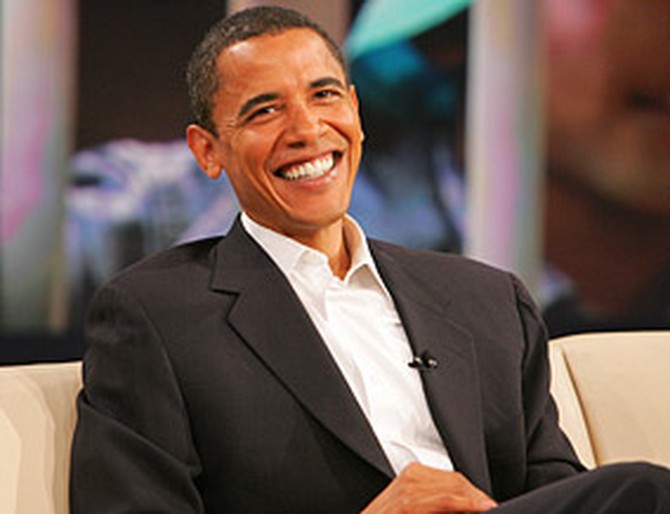
In July 2004, Barack Obama burst onto the political scene with an electrifying speech at the Democratic National Convention. Months later, he won an Illinois seat in the U.S. Senate and became the nation's only African-American U.S. senator.
Newsweek magazine calls Senator Obama "a political phenomenon unlike any previously seen on the American scene." Since being elected, Senator Obama has been on the cover of Vogue magazine and won a Grammy® for best spoken word album. He even has a beer named after him!
Life wasn't always so blessed for Senator Obama. As the son of a white mother from Wichita, Kansas, and a black father from Kenya, he faced many challenges as a child. He lived in Indonesia, Hawaii, New York and Chicago before heading to Boston to attend Harvard Law School. After law school, he moved back to Chicago to become a civil rights attorney, community activist and an Illinois State Senator.
Today, Senator Obama's not only one of Oprah's representatives in the United States Senate, she says he's also her favorite senator!
Newsweek magazine calls Senator Obama "a political phenomenon unlike any previously seen on the American scene." Since being elected, Senator Obama has been on the cover of Vogue magazine and won a Grammy® for best spoken word album. He even has a beer named after him!
Life wasn't always so blessed for Senator Obama. As the son of a white mother from Wichita, Kansas, and a black father from Kenya, he faced many challenges as a child. He lived in Indonesia, Hawaii, New York and Chicago before heading to Boston to attend Harvard Law School. After law school, he moved back to Chicago to become a civil rights attorney, community activist and an Illinois State Senator.
Today, Senator Obama's not only one of Oprah's representatives in the United States Senate, she says he's also her favorite senator!
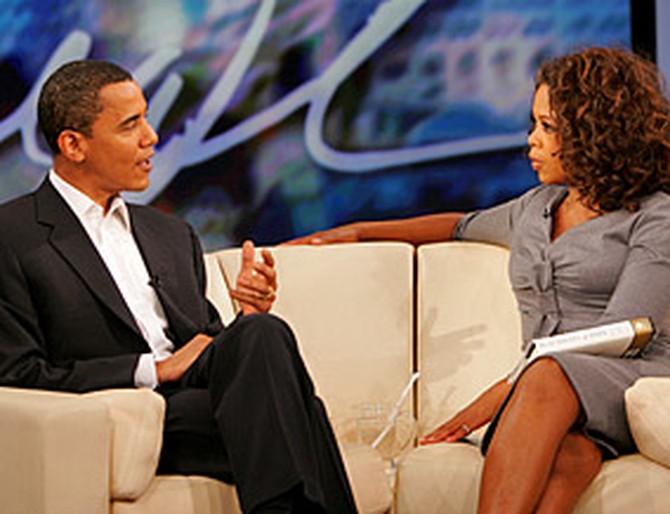
Long before Senator Obama was a political powerhouse, he penned his autobiography, Dreams from My Father. The book was first published in 1995 and then re-released in 2004. Senator Obama says he used proceeds from the best-selling book to pay off his college loans. "That's what happens when you don't have that trust fund!" he jokes.
Senator Obama says he wrote his second book, The Audacity of Hope, at night after his wife and two daughters were asleep. The title of the book was inspired by a sermon his pastor, Jeremiah Wright, gave at Chicago's Trinity United Church of Christ. "I was really struck by that phrase, because I think that one of the things that characterizes this country in particular is the sense that we can overcome...the sense that no matter how difficult our circumstances, we have the boldness to say, 'We can do better,'" he says.
Although he borrowed the book's title from his pastor, he says he wrote the rest on his own. "My own thoughts, my own ideas...a novel concept for a politician," he says.
Senator Obama says he wrote his second book, The Audacity of Hope, at night after his wife and two daughters were asleep. The title of the book was inspired by a sermon his pastor, Jeremiah Wright, gave at Chicago's Trinity United Church of Christ. "I was really struck by that phrase, because I think that one of the things that characterizes this country in particular is the sense that we can overcome...the sense that no matter how difficult our circumstances, we have the boldness to say, 'We can do better,'" he says.
Although he borrowed the book's title from his pastor, he says he wrote the rest on his own. "My own thoughts, my own ideas...a novel concept for a politician," he says.
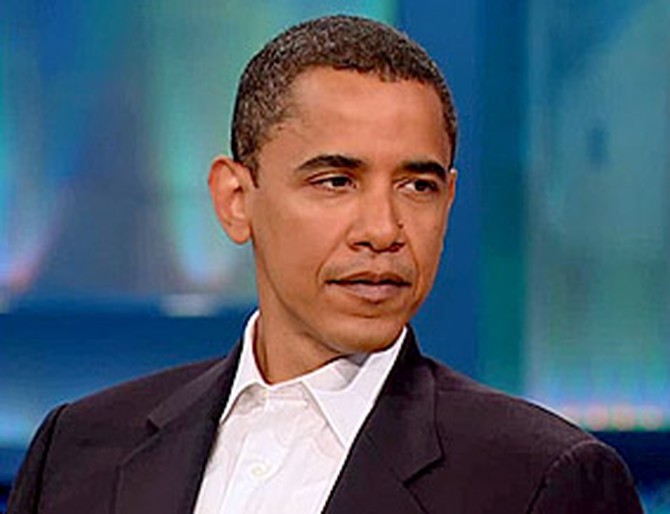
In The Audacity of Hope, Senator Obama calls for a more unified nation and less bipartisanship in politics. Although he's hopeful for America's future, he believes that democracy has gone awry in recent years.
"Sometimes [Americans] make progress—the Civil Rights Movement or abolition—and then sometimes we go into dark times," he says. "But, the general trajectory is upward. Martin Luther King once said, 'The arc of the moral universe is long, but it bends towards justice.' You can't always see it, but out on the horizon, it's moving in the direction of justice."
Senator Obama says many Americans are troubled because they're cynical about government and worried about issues like education, healthcare and the energy crisis. As a senator, husband and father, he is concerned about America's growing obsession with materialism—something he calls a "coarsening of the culture."
"I see it all the time," he says. "You see it in our youth, and you see it in the highest reaches of government—a sense that it's more important to be powerful and to be wealthy than it is to do right."
"Sometimes [Americans] make progress—the Civil Rights Movement or abolition—and then sometimes we go into dark times," he says. "But, the general trajectory is upward. Martin Luther King once said, 'The arc of the moral universe is long, but it bends towards justice.' You can't always see it, but out on the horizon, it's moving in the direction of justice."
Senator Obama says many Americans are troubled because they're cynical about government and worried about issues like education, healthcare and the energy crisis. As a senator, husband and father, he is concerned about America's growing obsession with materialism—something he calls a "coarsening of the culture."
"I see it all the time," he says. "You see it in our youth, and you see it in the highest reaches of government—a sense that it's more important to be powerful and to be wealthy than it is to do right."
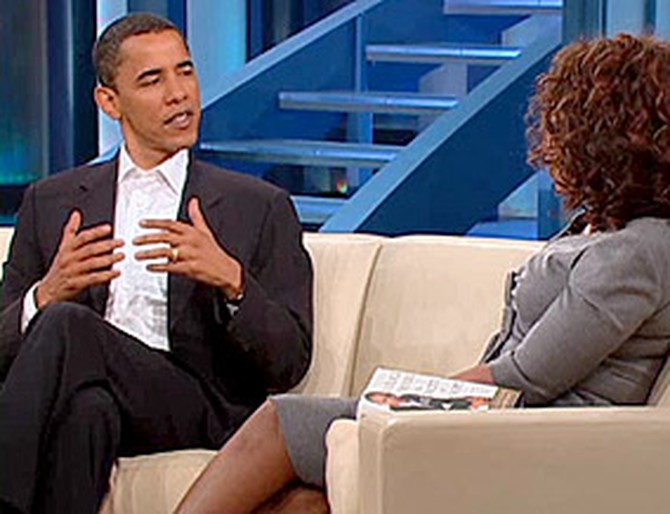
With so many 24-hour news channels and cable news shows on television, Senator Obama says facts often get distorted, which has led to a decline of truth in America. "[Americans] are so interested in spin," he says. Senator Obama believes that the highest branches of government "massaged and manipulated" facts to make a case for the war in Iraq.
Back in 2002, before he announced that he was going to run for Senate, Senator Obama was at a political rally about a mile away from Oprah's studio, where he says he voiced his opposition to the war in Iraq. "People were really beating the drum of war,'" he says. "I said it was a bad idea because, at that time, I had a sense that we didn't have evidence that there were weapons of mass destruction."
Back in 2002, before he announced that he was going to run for Senate, Senator Obama was at a political rally about a mile away from Oprah's studio, where he says he voiced his opposition to the war in Iraq. "People were really beating the drum of war,'" he says. "I said it was a bad idea because, at that time, I had a sense that we didn't have evidence that there were weapons of mass destruction."
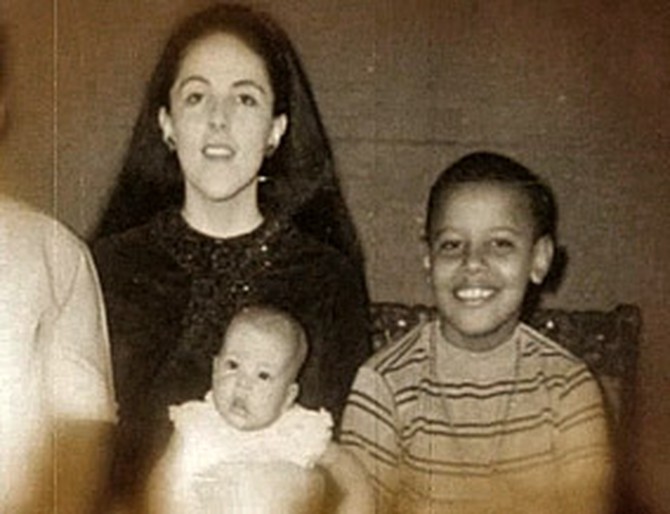
The truth is, Senator Obama says, sometimes Democrats need to listen to Republicans and vice versa. "The country's not as divided as Washington seems," he says. "I think conservatives are more tolerant than we make them out to be. Liberals are concerned about values, contrary to what conservatives say."
The key to unifying America is finding a common ground. "We have these powerful values that are in common in terms of self reliance and hard work and honesty and kindness—all the things our mothers and grandmothers taught us," he says. "If we can get those values expressed in our politics, then I think we can actually start solving problems instead of arguing and bickering all the time."
Senator Obama says lessons his mother taught him as a child continue to steer his politics today. "My mother taught me empathy—the basic concept of standing in somebody else's shoes and looking through their eyes. If I did something messed up, she'd just say, 'How would that make you feel if somebody did that to you?' That ends up being, I think, at the center of my politics, and I think that should be the center of all our politics. If we see a child who's languishing in an inner-city school, how would we feel if that was our child?"
The key to unifying America is finding a common ground. "We have these powerful values that are in common in terms of self reliance and hard work and honesty and kindness—all the things our mothers and grandmothers taught us," he says. "If we can get those values expressed in our politics, then I think we can actually start solving problems instead of arguing and bickering all the time."
Senator Obama says lessons his mother taught him as a child continue to steer his politics today. "My mother taught me empathy—the basic concept of standing in somebody else's shoes and looking through their eyes. If I did something messed up, she'd just say, 'How would that make you feel if somebody did that to you?' That ends up being, I think, at the center of my politics, and I think that should be the center of all our politics. If we see a child who's languishing in an inner-city school, how would we feel if that was our child?"
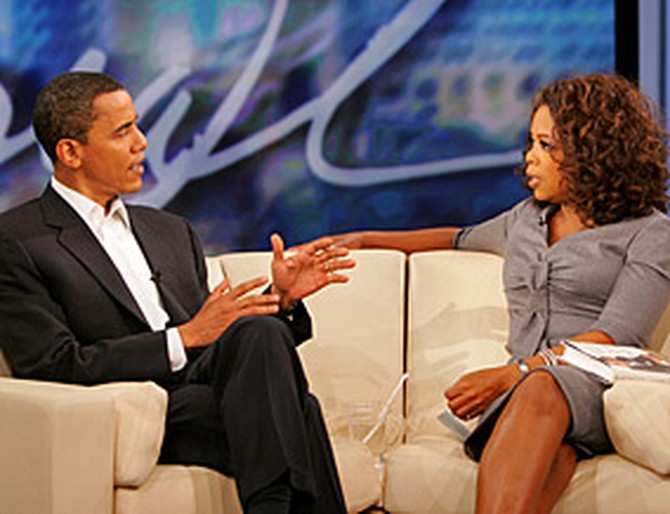
Over the summer Oprah offered Senator Obama a seat on her private plane, but he turned her down. Why does he prefer to fly coach? He says he instituted a policy after he became a senator that he wouldn't fly on corporate jets...not even Oprah's!
"I started realizing that when you get in the habit of taking corporate jets and eating dinner with lobbyists, you start getting detached from the people that you represent," he says. "One of the things that I'm always worried about is starting to represent Washington to my constituents instead of representing my constituents in Washington."
One night, while waiting to board a flight at Chicago's O'Hare Airport, Senator Obama says he met a young man who had Parkinson's disease. The man said doctors didn't think he'd ever be able to throw a baseball to his 3-year-old son, and he asked Senator Obama to vote for stem cell research legislation. "It was just a small moment, but it reminded me of why I got into politics and why you want to make sure that you are always there," he says.
With all the attention Senator Obama gets, he says it's sometimes hard to separate public service and celebrity status. "Politics sometimes blends in with celebrity, and it gobbles you up. The tendency is for people to want to see you perform and to say what they want to hear, as opposed to you trying to stay in touch with that deepest part of you—that kernel of truth inside of each other."
"I started realizing that when you get in the habit of taking corporate jets and eating dinner with lobbyists, you start getting detached from the people that you represent," he says. "One of the things that I'm always worried about is starting to represent Washington to my constituents instead of representing my constituents in Washington."
One night, while waiting to board a flight at Chicago's O'Hare Airport, Senator Obama says he met a young man who had Parkinson's disease. The man said doctors didn't think he'd ever be able to throw a baseball to his 3-year-old son, and he asked Senator Obama to vote for stem cell research legislation. "It was just a small moment, but it reminded me of why I got into politics and why you want to make sure that you are always there," he says.
With all the attention Senator Obama gets, he says it's sometimes hard to separate public service and celebrity status. "Politics sometimes blends in with celebrity, and it gobbles you up. The tendency is for people to want to see you perform and to say what they want to hear, as opposed to you trying to stay in touch with that deepest part of you—that kernel of truth inside of each other."
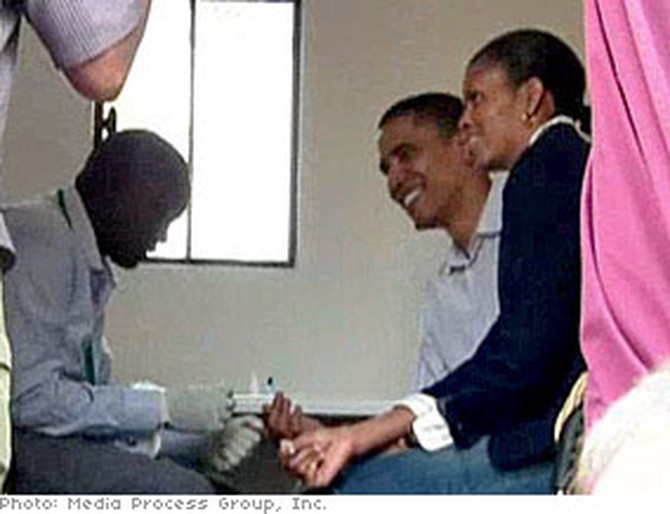
In August 2006, Senator Obama traveled with his family to Africa where he received a welcome that caught him by surprise, he says. During his trip, Senator Obama visited Ethiopia, Djibouti, Chad and South Africa, but in Kenya, his father's homeland, he received a hero's welcome.
People walked for miles to see Senator Obama, and the closer he got to his father's village, the more Obama mania grew. People cheered, danced and sang songs written just for him. The local school was even renamed in his honor!
While in Kenya, Senator Obama and his wife, Michelle, did something truly groundbreaking...they agreed to take HIV/AIDS tests in public. In a region plagued by HIV, this simple act helped remove the stigma of getting tested.
The Center for Disease Control, which runs testing programs in the region, told Senator Obama that if he got tested with Michelle, it could encourage approximately 500,000 more people to get tested.
People walked for miles to see Senator Obama, and the closer he got to his father's village, the more Obama mania grew. People cheered, danced and sang songs written just for him. The local school was even renamed in his honor!
While in Kenya, Senator Obama and his wife, Michelle, did something truly groundbreaking...they agreed to take HIV/AIDS tests in public. In a region plagued by HIV, this simple act helped remove the stigma of getting tested.
The Center for Disease Control, which runs testing programs in the region, told Senator Obama that if he got tested with Michelle, it could encourage approximately 500,000 more people to get tested.
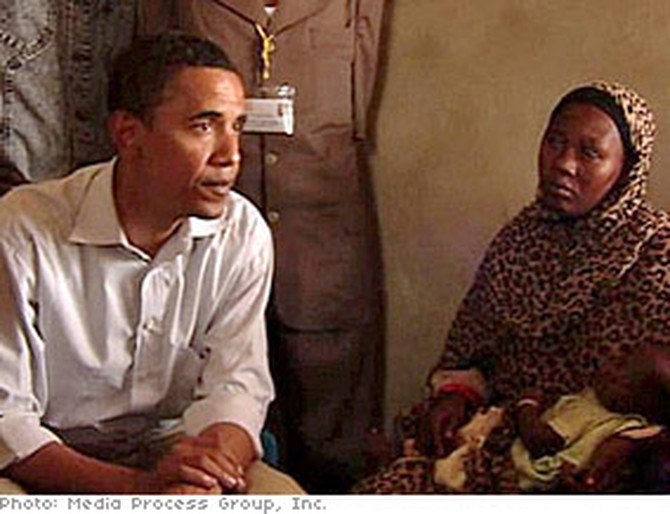
It's been called the world's worst humanitarian crisis. Before Senator Obama left Africa, he wanted to see what was happening to the people of Sudan's Darfur region firsthand.
He traveled to a Sudanese refugee camp where he met families who had been terrorized by Arab fighters known as the Janjaweed. In Darfur, the Janjaweed have been slaughtering black civilians for more than three years. Some have called it a genocide. More than 400,000 people have been killed and millions more are without food, water and shelter. To escape the murderous rampage, millions have fled to refugee camps in Chad, near the Sudanese border.
At the Me-el refugee camp, which shelters more than 15,000 people, Senator Obama met a woman who lost 10 family members during a Janjaweed massacre.
He traveled to a Sudanese refugee camp where he met families who had been terrorized by Arab fighters known as the Janjaweed. In Darfur, the Janjaweed have been slaughtering black civilians for more than three years. Some have called it a genocide. More than 400,000 people have been killed and millions more are without food, water and shelter. To escape the murderous rampage, millions have fled to refugee camps in Chad, near the Sudanese border.
At the Me-el refugee camp, which shelters more than 15,000 people, Senator Obama met a woman who lost 10 family members during a Janjaweed massacre.
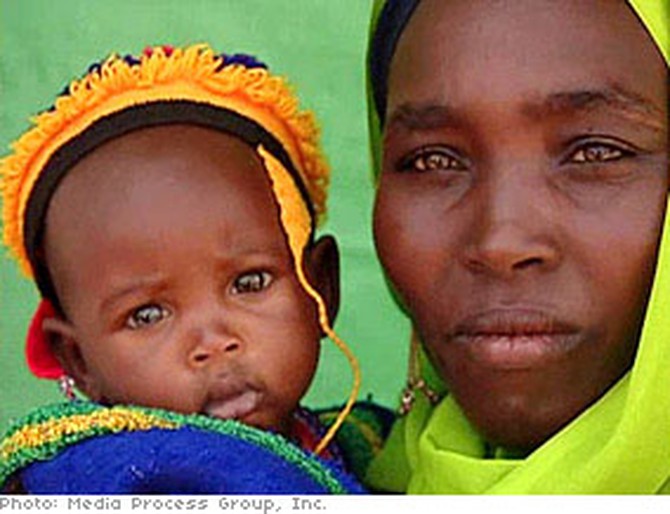
In Washington, D.C., lawmakers have been working to pass legislation that would provide protection for the people of Darfur and help the aid workers who are running understaffed refugee camps.
Senator Obama urges all Americans to send a letter to their congressman, senator or even the President of the United States and ask lawmakers to vote for the Darfur bill. This legislation would help strengthen the African Union peacekeeping force, transition peacekeeping responsibilities to a stronger U.N. force and increase aid levels.
"There are a lot of problems in the world, and we can't solve all of them," Senator Obama says. "But we do, all of us, have an obligation when there's a genocide taking place ... Those of us who are fortunate enough to live in the United States or other places need to, as an international community, make sure that we're providing them with some protection."
"Try to put yourself in the people of Darfur's shoes," he says. "Beneath the surface, we all have the same hopes and dreams and fears. The human story is universal. Those families we saw in Darfur love their children in the same way. They just don't have the same tools to care for them in the ways that we hopefully care for our children."
Senator Obama urges all Americans to send a letter to their congressman, senator or even the President of the United States and ask lawmakers to vote for the Darfur bill. This legislation would help strengthen the African Union peacekeeping force, transition peacekeeping responsibilities to a stronger U.N. force and increase aid levels.
"There are a lot of problems in the world, and we can't solve all of them," Senator Obama says. "But we do, all of us, have an obligation when there's a genocide taking place ... Those of us who are fortunate enough to live in the United States or other places need to, as an international community, make sure that we're providing them with some protection."
"Try to put yourself in the people of Darfur's shoes," he says. "Beneath the surface, we all have the same hopes and dreams and fears. The human story is universal. Those families we saw in Darfur love their children in the same way. They just don't have the same tools to care for them in the ways that we hopefully care for our children."
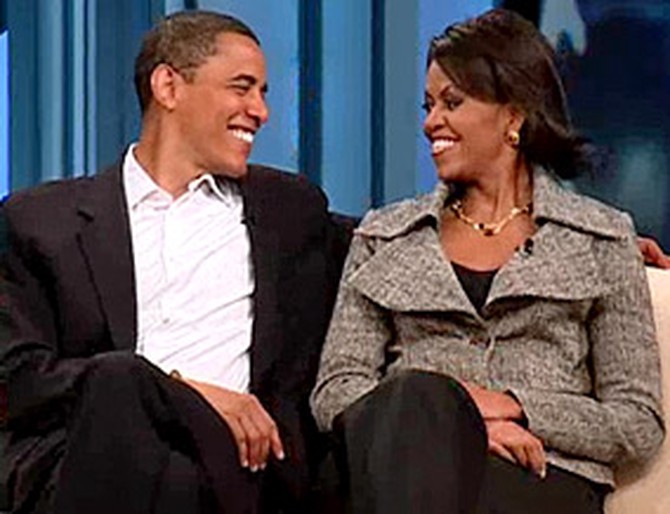
Despite his busy schedule, Senator Obama puts family first. He and his wife, Michelle, have been married for 14 years, and they have two daughters, Malia and Sasha. The senator says being a good father and husband is a constant reminder of what's important in his life.
"If my wife thinks that I'm a solid guy and if my daughters know that I love them and want to spend time with them, then that is probably the most important reward that I receive," Senator Obama says. "It's a terrific check on all the distractions and hype and hoopla that sometimes can bring you down when you're in politics."
Senator Obama also makes time for his diverse, extended family. "Michelle will tell you that when we get together for Christmas or Thanksgiving, it's like a little mini-United Nations," he says. For example, his half-Indonesian half-sister is married to a Chinese-Canadian. "I've got relatives who look like Bernie Mac, and I've got relatives who look like Margaret Thatcher," he says "We've got it all."
"If my wife thinks that I'm a solid guy and if my daughters know that I love them and want to spend time with them, then that is probably the most important reward that I receive," Senator Obama says. "It's a terrific check on all the distractions and hype and hoopla that sometimes can bring you down when you're in politics."
Senator Obama also makes time for his diverse, extended family. "Michelle will tell you that when we get together for Christmas or Thanksgiving, it's like a little mini-United Nations," he says. For example, his half-Indonesian half-sister is married to a Chinese-Canadian. "I've got relatives who look like Bernie Mac, and I've got relatives who look like Margaret Thatcher," he says "We've got it all."
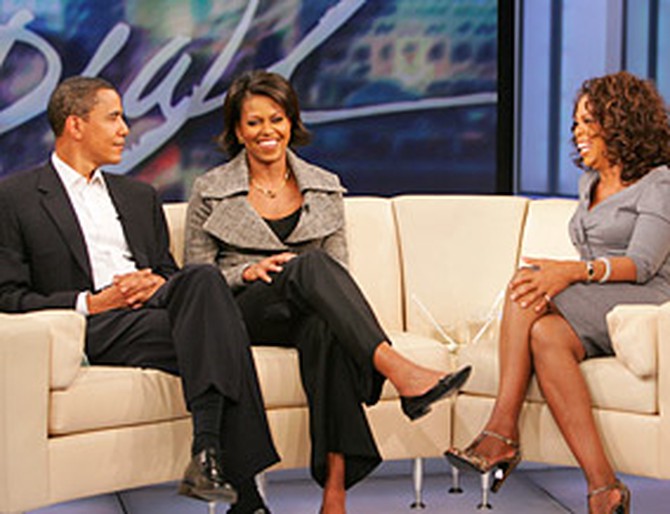
Senator Obama and Michelle work hard to maintain a sense of normalcy in their marriage. One way they do that is by raising their kids back home in Chicago. "You just really want to stay grounded in a place that you feel is home," Michelle says.
Even though Senator Obama often spends part of the week in Washington, D.C., Michelle never lets him out of his household responsibilities.
Senator Obama recalls a time he was excited about introducing a bill on nonproliferation, but nuclear weapons were far from Michelle's mind. "I called Michelle and I'm saying, 'Look, this is going to be a terrific piece of legislation,'" he says. "She says, 'We have ants.'"
Michelle asked the senator to stop for ant traps on the way home. "I'm thinking, 'Is John McCain stopping by Walgreen's to grab ant traps on the way home?'" he says.
"If he's not, he should be," Michelle says.
Even though Senator Obama often spends part of the week in Washington, D.C., Michelle never lets him out of his household responsibilities.
Senator Obama recalls a time he was excited about introducing a bill on nonproliferation, but nuclear weapons were far from Michelle's mind. "I called Michelle and I'm saying, 'Look, this is going to be a terrific piece of legislation,'" he says. "She says, 'We have ants.'"
Michelle asked the senator to stop for ant traps on the way home. "I'm thinking, 'Is John McCain stopping by Walgreen's to grab ant traps on the way home?'" he says.
"If he's not, he should be," Michelle says.
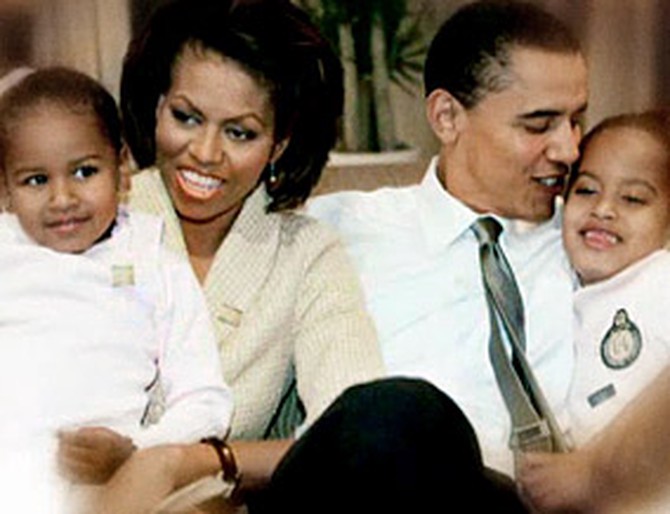
Some may be surprised to learn that while trying to solve the world's problems, Senator Obama continues to contribute to family chores—including ordering pizza and balloons for his daughter's birthday party. He even offered to get goody bags for the party, but Michelle drew the line. "I was, like, 'Oh, you can't handle goody bags, buddy,'" Michelle says. "I said, 'You'd walk into that party store and your head would explode.'"
"But the pizza and the balloons, they were there on time," Senator Obama jokes.
He may be a senator, but at home he is just a dad—and an embarrassing one at that! He once tried to shake the hand of one of 8-year-old Malia's friends and immediately got a talking to—kids, Malia says, don't shake hands. "'This is the 21st Century, Dad. ... Maybe they say 'hey.' They might wave. But they do not shake hands,'" he recalls Malia saying. "I said, 'I'm sorry to embarrass you.' She said, 'That's okay, Daddy. You didn't know any better.'"
Still, the senator appreciates his daughters' patience with him. "They're very indulgent of me. It's wonderful," he says.
"But the pizza and the balloons, they were there on time," Senator Obama jokes.
He may be a senator, but at home he is just a dad—and an embarrassing one at that! He once tried to shake the hand of one of 8-year-old Malia's friends and immediately got a talking to—kids, Malia says, don't shake hands. "'This is the 21st Century, Dad. ... Maybe they say 'hey.' They might wave. But they do not shake hands,'" he recalls Malia saying. "I said, 'I'm sorry to embarrass you.' She said, 'That's okay, Daddy. You didn't know any better.'"
Still, the senator appreciates his daughters' patience with him. "They're very indulgent of me. It's wonderful," he says.

Michelle says she admires the way her husband lives both his political aspirations and his family life. Although Michelle says she sometimes feels like a single parent, she accepts that time apart has "always sort of been the nature of the beast."
"It's not just the time, but it's the intent. It's what he does and how he reflects the importance of our relationship when he is there," Michelle says.
Michelle says she feels like family isn't a compromise we should make in politics. "In my view...I want the next president to be someone who understands what it means to be a father and a husband and is contributing. Because I don't think he can represent those values for us as a nation if he can't do it in his own house," Michelle says. "Whoever [the president] may be."
"It's not just the time, but it's the intent. It's what he does and how he reflects the importance of our relationship when he is there," Michelle says.
Michelle says she feels like family isn't a compromise we should make in politics. "In my view...I want the next president to be someone who understands what it means to be a father and a husband and is contributing. Because I don't think he can represent those values for us as a nation if he can't do it in his own house," Michelle says. "Whoever [the president] may be."
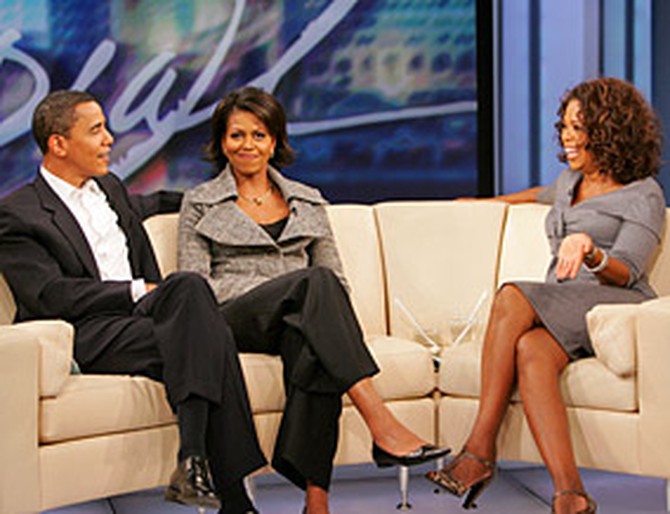
In an interview on CNN's Larry King Live, Oprah encouraged people to support Barack Obama in a presidential run because she feels he can make a difference. "I know I don't just speak for myself," Oprah says. "There are a lot of people who would want you to run for the presidency of the United States."
So would Senator Obama consider running for president in 2008?
"You know, there's a wonderful saying that...the most important office in a democracy is the office of citizen," he says. "We have an election coming up in '06 that is going to determine who's in power in Congress...and that's what I'm spending all my energy [on] ... to make sure that people are paying attention to this election."
Oprah has one more question for Senator Obama. "If you ever would decide to run within the next five years...would you announce on this show?" she asks.
"I don't think I could say no to you," Senator Obama says. "Oprah, you're my girl."
So would Senator Obama consider running for president in 2008?
"You know, there's a wonderful saying that...the most important office in a democracy is the office of citizen," he says. "We have an election coming up in '06 that is going to determine who's in power in Congress...and that's what I'm spending all my energy [on] ... to make sure that people are paying attention to this election."
Oprah has one more question for Senator Obama. "If you ever would decide to run within the next five years...would you announce on this show?" she asks.
"I don't think I could say no to you," Senator Obama says. "Oprah, you're my girl."
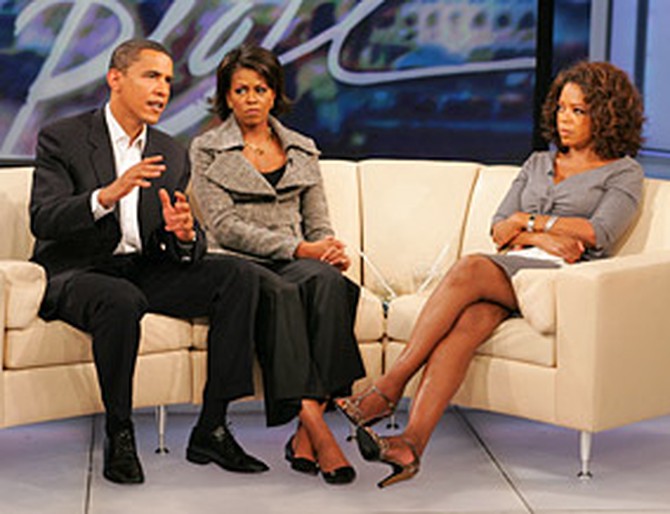
Senator Obama's vision of service for the United States boils down to one simple question: Are you useful?
"You know, we reward people a lot for being rich or being famous or being cute or being thin," he says. "One of the values that I think we need to instill in our country, in our children, is a sense, are you useful? Are you useful to other people? Are you making other people's lives a little bit better?"
"You know, we reward people a lot for being rich or being famous or being cute or being thin," he says. "One of the values that I think we need to instill in our country, in our children, is a sense, are you useful? Are you useful to other people? Are you making other people's lives a little bit better?"
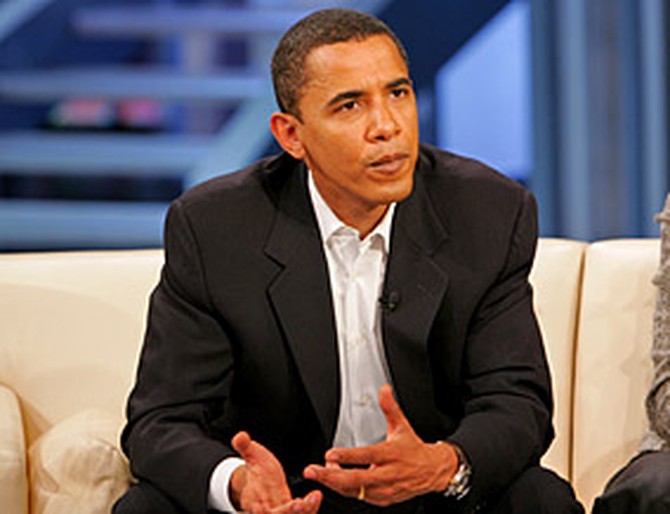
A number of social, economic and political issues currently divide Americans more than they unite them. Does Senator Obama think it's possible to reclaim the American dream in our lifetime?
"Absolutely, I think it's possible. I think the country is ready for a constructive, hard-headed debate about how we move the country forward," he says. "I think the country's ready. I think it's a matter of leadership stepping up and giving people the opportunity to have this conversation. If we do, I'm very hopeful about the future of America ... and I'm so lucky to be a part of that process of trying to move it forward."
"Absolutely, I think it's possible. I think the country is ready for a constructive, hard-headed debate about how we move the country forward," he says. "I think the country's ready. I think it's a matter of leadership stepping up and giving people the opportunity to have this conversation. If we do, I'm very hopeful about the future of America ... and I'm so lucky to be a part of that process of trying to move it forward."
Published 10/18/2006

